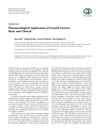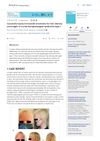 45 citations,
August 2019 in “Dermatologic Therapy”
45 citations,
August 2019 in “Dermatologic Therapy” Hair loss treatments work better with lifestyle changes.
June 2024 in “Regenerative Therapy” iPSCs show promise for hair regeneration but need more research to improve reliability and effectiveness.
 9 citations,
May 2019 in “Experimental Cell Research”
9 citations,
May 2019 in “Experimental Cell Research” HPV genes and estradiol increase a cancer-related signaling pathway, which may be targeted for cervical cancer treatment.
 1 citations,
January 2023 in “Burns and trauma”
1 citations,
January 2023 in “Burns and trauma” Tiny particles from 3D-grown skin cells speed up wound healing by promoting blood vessel growth.
 6 citations,
April 2023 in “Frontiers in plant science”
6 citations,
April 2023 in “Frontiers in plant science” Certain bacteria can boost lentil growth and improve soil used for farming.
 20 citations,
January 2018 in “Expert Opinion on Drug Safety”
20 citations,
January 2018 in “Expert Opinion on Drug Safety” Personalized treatment with inhibitors, minoxidil, and laser therapy helps hair loss.
 1 citations,
April 2023 in “Biomolecules”
1 citations,
April 2023 in “Biomolecules” Fermented papaya and mangosteen in hair care products helped prevent hair loss and improve hair thickness.
 16 citations,
December 2018 in “Plant Science”
16 citations,
December 2018 in “Plant Science” Elevated CO2 can lessen the negative impact of water shortage on soybean roots and affects specific genes.
 101 citations,
January 1997 in “Journal of Investigative Dermatology Symposium Proceedings”
101 citations,
January 1997 in “Journal of Investigative Dermatology Symposium Proceedings” Nerves and chemicals in the body can affect hair growth and loss.
 52 citations,
September 2018 in “International Journal of Molecular Sciences”
52 citations,
September 2018 in “International Journal of Molecular Sciences” Ginseng and its compounds may help hair growth and prevent hair loss, but more human trials are needed to confirm this.
 November 2024 in “Research Square (Research Square)”
November 2024 in “Research Square (Research Square)” Moracin M boosts hair growth by activating key pathways and promoting cell growth.
 May 2022 in “Research Square (Research Square)”
May 2022 in “Research Square (Research Square)” Prunus mira Koehne kernels contain components like Vitamin E, β-sitosterol, and linoleic acid that can promote hair growth in mice.
 46 citations,
August 2003 in “The journal of investigative dermatology/Journal of investigative dermatology”
46 citations,
August 2003 in “The journal of investigative dermatology/Journal of investigative dermatology” Phosphatidic acid may help hair grow by affecting cell growth pathways.
 2 citations,
January 2015 in “BioMed Research International”
2 citations,
January 2015 in “BioMed Research International” Growth factor treatments are increasingly used in medicine but require more research to fully understand their mechanisms.
 January 2024 in “Pediatric Dermatology”
January 2024 in “Pediatric Dermatology” Minoxidil improved hair growth in a child with a rare genetic disorder.
 1 citations,
December 2019 in “Journal of medicine and life science”
1 citations,
December 2019 in “Journal of medicine and life science” Docosahexaenoic acid (DHA) may help hair growth by promoting dermal papilla cell proliferation.
92 citations,
December 2005 in “The Journal of clinical investigation/The journal of clinical investigation” Human hair follicle stem cells can be isolated using specific markers for potential therapeutic use.
 359 citations,
January 2015 in “Cold Spring Harbor Perspectives in Medicine”
359 citations,
January 2015 in “Cold Spring Harbor Perspectives in Medicine” Hair growth phase and certain genes can speed up wound healing, while an inflammatory mediator can slow down new hair growth after a wound. Understanding these factors can improve tissue regeneration during wound healing.
 4 citations,
January 2017 in “Indian Dermatology Online Journal”
4 citations,
January 2017 in “Indian Dermatology Online Journal” A child used a hair growth lotion for hair loss, but it caused excessive hair growth on his face and neck instead.
 January 2024 in “Expert Opinion on Pharmacotherapy”
January 2024 in “Expert Opinion on Pharmacotherapy” Low-dose oral minoxidil is effective and safe for treating hair loss in men and women.
 100 citations,
November 1996 in “Molecular Medicine Today”
100 citations,
November 1996 in “Molecular Medicine Today” Growth factors and cytokines are important for hair growth and could potentially treat hair loss, but more research is needed to overcome challenges before they can be used in treatments.
 2 citations,
August 2020 in “Natural Product Communications”
2 citations,
August 2020 in “Natural Product Communications” A mix of Platycladus orientalis leaf extract and alpha-terpineol helps mice grow hair by increasing growth factors and cell growth.
 270 citations,
March 2012 in “Dermatologic Surgery”
270 citations,
March 2012 in “Dermatologic Surgery” Platelet-rich plasma can potentially promote hair growth by stimulating cell growth and increasing certain proteins.
 39 citations,
December 2013 in “Phytotherapy Research”
39 citations,
December 2013 in “Phytotherapy Research” Safflower (Carthamus tinctorius) extract helps hair grow and could be used in hair products.
 20 citations,
October 2008 in “Archives of dermatological research”
20 citations,
October 2008 in “Archives of dermatological research” Angiogenin helps hair grow by stimulating cell growth and blood vessel formation.
 21 citations,
January 2015 in “Journal of Dermatological Science”
21 citations,
January 2015 in “Journal of Dermatological Science” Ginsenosides in Panax ginseng boost hair growth like minoxidil.
 8 citations,
January 2016 in “Annals of Dermatology”
8 citations,
January 2016 in “Annals of Dermatology” A complex of 5-aminolevulinic acid and glycyl-histidyl-lysine peptide may help increase hair count in male pattern hair loss without side effects.
 March 2023 in “Journal of Applied Biomedicine”
March 2023 in “Journal of Applied Biomedicine” Oleanolic acid improved hair growth in mice by affecting hair growth pathways and reducing inflammation.
February 2023 in “International journal of molecular sciences” Infrared spectral imaging can effectively study protein distribution in hair follicles during hair growth.
 February 2023 in “Molecules”
February 2023 in “Molecules” Cactus extract from Notocactus ottonis may help promote hair growth.



























